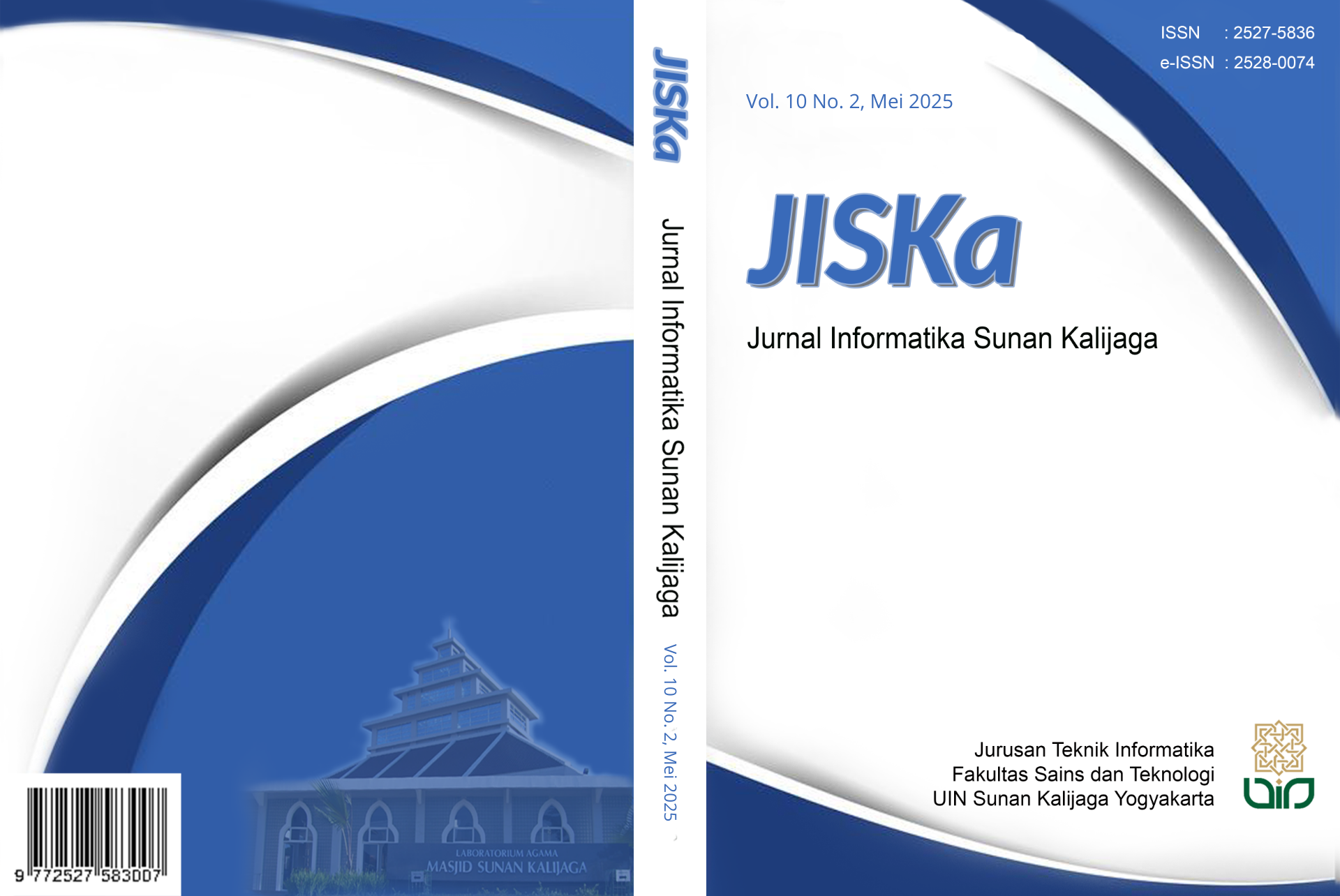Analisis Cluster untuk Pengelompokan Kemampuan Penguasaan ICT Menggunakan K-Means dan Autoencoder
DOI:
https://doi.org/10.14421/jiska.2025.10.2.145-157Keywords:
Clustering, K-Means, Autoencoder, ICT, Silhoutte, Davies-Bouldin IndexAbstract
Information and Communication Technology (ICT) skills are essential in today's digital age. However, numerous new students possess varying levels of ICT proficiency and may lack the necessary skills expected by universities. ICT training is essential for enhancing students' ICT skills. Nevertheless, delivering the same training to all students proves to be less effective. Therefore, grouping students' ICT skills is crucial to ensure that the training provided aligns with the fundamental abilities of the students. Cluster analysis is a common method for grouping data. This study employs k-Means and autoencoder for cluster analysis, with autoencoder utilized to reduce data dimensions and k-Means to perform the clustering process. The Elbow method is utilized to identify the ideal number of clusters. The optimal number of clusters determined was three clusters. Model evaluation was conducted using the Silhouette coefficient and the Davies-Bouldin Index (DBI). The evaluation results revealed that the combination of k-Means and autoencoder yields superior performance compared to using k-Means alone, as evidenced by a higher Silhouette value and a lower DBI value.
References
Abidin, N. A. S. Z., Avila, R. D., Hermatyar, A., & Rismayani, R. (2022). Perbandingan Algoritma K-Means dan K-Medoids untuk Pengelompokan Daerah Produksi Kakao. Jurnal Teknik Informatika dan Sistem Informasi, 8(2). https://doi.org/10.28932/jutisi.v8i2.4897
Agarwal, V. (2015). Research on Data Preprocessing and Categorization Technique for Smartphone Review Analysis. International Journal of Computer Applications, 131(4), 30–36. https://doi.org/10.5120/ijca2015907309
Baser, P., & R. Saini, J. (2015). Agent based Stock Clustering for Efficient Portfolio Management. International Journal of Computer Applications, 116(3), 35–41. https://doi.org/10.5120/20317-2381
Behera, M. P., Sarangi, A., & Mishra, D. (2021). K-medoids Crazy Firefly Algorithm for Unsupervised Data Clustering. 2021 1st Odisha International Conference on Electrical Power Engineering, Communication and Computing Technology (ODICON), 1–6. https://doi.org/10.1109/ODICON50556.2021.9428980
Cui, M. (2020). Introduction to the K-Means Clustering Algorithm Based on the Elbow Method. Accounting, Auditing and Finance Clausius Scientific Press, 1(1). https://doi.org/10.23977/accaf.2020.010102
Dona, D., & Rifqi, M. (2022). Penerapan Metode K-Means Clustering untuk Menentukan Status Gizi Baik dan Gizi Buruk pada Balita (Studi Kasus Kabupaten Rokan Hulu). Rabit: Jurnal Teknologi dan Sistem Informasi Univrab, 7(2), 179–191. https://doi.org/10.36341/rabit.v7i2.2171
Fitriani, M. N. R., Priyatna, B., Huda, B., Hananto, A. L., & Tukino, T. (2023). Implementasi Metode K-Means untuk Memprediksi Status Kredit Macet. Jurnal Sistem Komputer dan Informatika (JSON), 4(3), 554. https://doi.org/10.30865/json.v4i3.5953
Marutho, D., Handaka, S. H., Wijaya, E., & Muljono, M. (2018). The Determination of Cluster Number at k-Mean Using Elbow Method and Purity Evaluation on Headline News. 2018 International Seminar on Application for Technology of Information and Communication, 533–538. https://doi.org/10.1109/ISEMANTIC.2018.8549751
Mcilhany, K., & Wiggins, S. (2018). High Dimensional Cluster Analysis Using Path Lengths. Journal of Data Analysis and Information Processing, 06(03), 93–125. https://doi.org/10.4236/jdaip.2018.63007
Musfiani, M. (2019). Analisis Cluster dengan Menggunakan Metode Partisi pada Pengguna Alat Kontrasepsi di Kalimantan Barat. Bimaster: Buletin Ilmiah Matematika, Statistika dan Terapannya, 8(4), 893–902. https://doi.org/10.26418/bbimst.v8i4.36584
Nainggolan, R., Perangin-angin, R., Simarmata, E., & Tarigan, A. F. (2019). Improved the Performance of the K-Means Cluster Using the Sum of Squared Error (SSE) Optimized by Using the Elbow Method. Journal of Physics: Conference Series, 1361(1), 012015. https://doi.org/10.1088/1742-6596/1361/1/012015
Novoselsky, A., & Kagan, E. (2021). An Introduction to Cluster Analysis. In An Introduction to Toxicogenomics (pp. 1–9). Chapman and Hall/CRC. https://doi.org/10.13140/RG.2.2.25993.57448/1
Nugroho, H., Susanty, M., Irawan, A., Koyimatu, M., & Yunita, A. (2020). Fully Convolutional Variational Autoencoder for Feature Extraction of Fire Detection System. Jurnal Ilmu Komputer dan Informasi, 13(1), 9–15. https://doi.org/10.21609/jiki.v13i1.761
Nur Aziz, Y. A., & Zuliarso, E. (2022). Sistem Penerimaan Siswa Baru di Smkn 3 Pati Berdasar Jalur Prestasi Menggunakan Algoritma Klastering K-Means Berbasis Web. Jurnal Ilmiah Informatika, 10(02), 86–95. https://doi.org/10.33884/jif.v10i02.5555
Prihanditya, H. A., & Alamsyah. (2020). The Implementation of Z-Score Normalization and Boosting Techniques to Increase Accuracy of C4.5 Algorithm in Diagnosing Chronic Kidney Disease. Journal of Soft Computing Exploration, 1(1), 63–69. https://doi.org/10.52465/joscex.v1i1.8
Velmurugan, T. (2018). A State of Art Analysis of Telecommunication Data by k-Means and k-Medoids Clustering Algorithms. Journal of Computer and Communications, 06(01), 190–202. https://doi.org/10.4236/jcc.2018.61019
Wu, C., Yan, B., Yu, R., Yu, B., Zhou, X., Yu, Y., & Chen, N. (2021). K‐Means Clustering Algorithm and Its Simulation Based on Distributed Computing Platform. Complexity, 2021(1). https://doi.org/10.1155/2021/9446653
Xu, D., & Tian, Y. (2015). A Comprehensive Survey of Clustering Algorithms. Annals of Data Science, 2(2), 165–193. https://doi.org/10.1007/s40745-015-0040-1
Yuan, C., & Yang, H. (2019). Research on K-Value Selection Method of K-Means Clustering Algorithm. J, 2(2), 226–235. https://doi.org/10.3390/j2020016
Zhai, J., Zhang, S., Chen, J., & He, Q. (2018). Autoencoder and Its Various Variants. 2018 IEEE International Conference on Systems, Man, and Cybernetics (SMC), 415–419. https://doi.org/10.1109/SMC.2018.00080
Zhao, Y., & Zhou, X. (2021). K-means Clustering Algorithm and Its Improvement Research. Journal of Physics: Conference Series, 1873(1), 012074. https://doi.org/10.1088/1742-6596/1873/1/012074
Downloads
Published
How to Cite
Issue
Section
License
Copyright (c) 2025 Daru Prasetyawan, Rahmadhan Gatra

This work is licensed under a Creative Commons Attribution-NonCommercial 4.0 International License.
Authors who publish with this journal agree to the following terms as stated in http://creativecommons.org/licenses/by-nc/4.0
a. Authors retain copyright and grant the journal right of first publication with the work simultaneously licensed under a Creative Commons Attribution License that allows others to share the work with an acknowledgement of the work's authorship and initial publication in this journal.
b. Authors are able to enter into separate, additional contractual arrangements for the non-exclusive distribution of the journal's published version of the work (e.g., post it to an institutional repository or publish it in a book), with an acknowledgement of its initial publication in this journal.
c. Authors are permitted and encouraged to post their work online (e.g., in institutional repositories or on their website) prior to and during the submission process, as it can lead to productive exchanges, as well as earlier and greater citation of published work.










